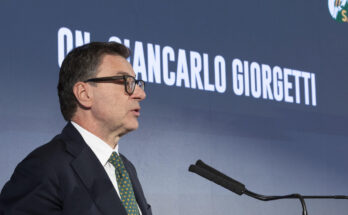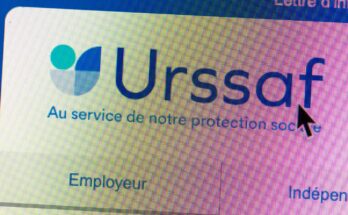Carlos Mazón wears red glasses. It takes them away. Dressed in a dark blue suit and a white shirt, he settles into a beige leather armchair in the Prim room of the Congress of Deputies, a wooden and parquet room where parliamentary commissions, like this one, are held, full of politicians, cameras, journalists, photographers. The anticipation for this Monday is maximum. Ione Belarra, spokesperson for Podemos, activates the microphone. The session on dana in the Valencian Community begins:
–You are responsible for the deaths of 229 people!
The interim president seems a little uncomfortable. Even the popular deputies and senators who came to accompany him. For the first time and a year after the tragedy in the region he still presides, and while PP and Vox negotiate his successor, he found himself faced with questions about that day, where the opposition, unlike a few days ago in another dana committee of the Valencian Parliament, can now question him bluntly about that afternoon of October 29, 2024, in question and answer format, with comparisons.
The result, however, was not as expected. Mazón provided almost no information about some of the unknowns that afternoon.
“I resigned from my position. It is impossible to report what you don’t know”, he began by way of political justification. “We were very alone. I was making phone calls. I spoke to the counselor several times.” If a year later there are gaps to clarify in his agenda, like what he did in those 37 minutes since he left the El Ventorro restaurant, after having had lunch with the journalist Maribel Vilaplana for four hours, and went to the Palau de la Generalitat, he now says he took a walk until he arrived at the Palau. Who didn’t hear the call he received at that time, around 7.11pm, coming from his emergency assistant:
—I don’t know if he was walking and had his cell phone in his backpack.
The Valencian socialist deputy Alejandro Soler has inquired about the issue.
—Why the cell phone in the backpack?
Mazón, however, did not clarify the issue. He said that during lunch at Ventorro he drank water and wine. Soler continued with the questioning:
–Did no one ask you to leave the restaurant?
-NO.
–Was it in optimal condition?
-Yes.
—What time do I leave Vilaplana in the parking lot?
—I can’t go into the full minutes.
—Did you enter the parking lot?
-NO.
—Is it normal for me to go without a companion?
—Before the dana, yes.
—Did he stop by the house?
-NO.
No. Mazón did not read documents this time. In a low tone (“no one thought about it more than me, including insomnia, we lacked information)” he avoided any technical responsibility in managing the tragedy. Knowing that what is said in a parliamentary setting has criminal readings if it lies. Both Belarra, spokesperson for Podemos, and the Compromí deputy, Àgueda Micó, insisted.
—How many times have you spoken to the emergency counselor?
—I made my call list public.
—Don’t you remember?
—Two or three times. Even with those of Cecopi.
Cecopi is an organization that activates in emergency situations when the joint intervention of regional administrations and the State is necessary. Mazón said he went there of his own free will, even though it wasn’t necessary. “We knew there had been floods in Utiel. That’s why it was called Cecopi. There was no information about the Poyo ravine (which caused the big flood).”
The reality is that there was news. The Júcar Hydrographic Confederation sent 16 emails to warn of exceeding the thresholds of its flow meters in the Magro and Poyo basins. When questioned about the delay in the massive alarm to cell phones, sent at 8.11pm, and which the emergency room had already spoken about almost two hours earlier, he said that the consultant “never” asked him for a consultation. He also defended his top emergency manager’s handling of the emergency. “It doesn’t belong to me. Not to her either. It’s been proven.”
Mazón justified his stay in El Ventorro. “Nothing would have changed if I had arrived earlier in Cecopi because the information had not reached me (…) Nobody realized the extent. Nobody knew that people were drowning.” At this point, Vox deputy Ignacio Gil Lázaro intervened to defend him – before those from the PP – after hearing how Mazón had been defined as a “bad person”:
The interim president said he was the only one who asked for forgiveness. “I am responsible, perhaps out of naivety and perhaps for allowing the image of a president unrelated to the emergency to be transferred. I probably could have tried to go to Utiel. We thought that everything would be over at six in the afternoon. There is nothing that a president of the Generalitat cannot do that the Military Emergency Unit (UME) cannot do.”
The most tense moment was with Gabriel Rufián. Rufián said Mazón behaved like a psychopath. And he read numerous testimonies from relatives who lost children, grandchildren and grandparents that afternoon. Mazón, surprised by the precision of the time they died, asked:
—How do you know the time?
—Because it is in a judicial order. Doubt? Don’t give him a damn anymore.
A PP MP did not mince his words and shouted across the room: “What a clown.” The Vox deputy, who a few minutes earlier was defending Mazón, brought a questionnaire from home to criticize Pedro Sánchez’s government. That of the PP, more or less the same, but without questions for the Valencian leader, who used the last three minutes of his popular colleague’s speech for a final epilogue. And before leaving, in a small group, he blurted out:
−I would have liked to be able to talk more. And better.



